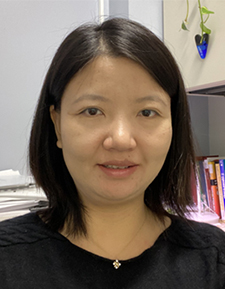Speakers
Meetings will offer insights into the cutting-edge science and current industry trends relevant to flavor.
Invited speakers for the 2024 summit includes representatives from Symrise, Coca-Cola, ADM, and Givaudan.
Speakers at past summits included representatives from ADM, IFF, Givaudan, the Monell Chemical Senses Center, Senomyx, Firmenich, University of Vienna, Ohio State University and Penn State University among others.
As speakers are confirmed, their topic and bios will be added to this page.

Ed Baranski
Givaudan Flavor Ingredients
Business Development Manager of Citrus
A veteran in the citrus industry, Ed Baranski is currently Business Development Manager of Citrus for Givaudan Flavor Ingredients (GFI). GFI sells taste, sense, nutrition and health ingredients to the flavour industry. Ed has spent the majority of his career leading plant operations for both large and small food ingredient companies. Prior to joining GFI in his current commercial role, he directed Givaudan's Citrus Center of Excellence facility in Lakeland, Florida. He graduated from Penn State University with a B.S. in Agricultural Engineering and earned an M.S. in Biomedical Engineering from the University of Virginia.
Ed and his wife Connie have two adult children. They recently moved to Daytona Beach Shores where they have plenty of things to do in their spare time including tennis, boating & fishing, and working out.
Presentation Title: Revolutionizing the world of flavor creation: Why BioNootkatone is the perfect replacement
Abstract: Nootkatone is a prized compound of grapefruit juice and peel oil, contributing woody, peely, and earthy notes to their distinguished flavor profiles. This presentation will explore the challenges associated with deriving nootkatone from fruit-based raw materials and propose an alternative source with high sustainability and long term supply assurance afforded by precision fermentation.

Matthias Guentert
Consultant, Ridgewood, New Jersey
Matthias Guentert has spent his entire career in the flavor and fragrance industry. He holds a Ph.D. in food chemistry from the University of Karlsruhe, Germany. Since retiring from his executive leadership position with Symrise he has been a consultant for flavors, food ingredients, food and fragrances. During his career of almost 30 years with Symrise he held various important technical and commercial leadership positions. From July 2008 until July 2014 he was the president of the flavor and nutrition division in North America. He also served for two terms as a member of the scientific advisory board of the German Institute for Food Chemistry in Freising, Germany (2005 – 2014). From May 2012 until May 2015 he was also elected to the FEMA Board of Governors in Washington, DC.
Presentation Title: The History and Evolution of Flavor Science
Abstract: Flavor is the main driving force for consumers in their decision to purchase a food product. Aroma and taste are therefore universally important concepts. Systematic research on food flavors started about 75 years ago and has been strongly correlated with the advances in chemical analysis, food technology, biotechnology, sensory analysis, and more recently human receptor science. The basic research and development work at academia and industry in the past decades has enabled food and beverage companies around the world to choose today from a wide variety of products for their applications. Technical performance, stability, safety, producibility, and regulatory compliance are the main characteristics of today's flavorings. This presentation shows the beginnings and evolution of flavor research to this day. It highlights some significant milestones, honors some main pioneers and illuminates some of the latest developments.

Thomas Kauz
Symrise
Analytical Research Manager
Dr. Thomas Kauz obtained his PhD in food chemistry at the Technical University of Munich under the supervision of Prof. Dr. Thomas Hofmann. In his work, he developed a high-throughput LC-MS/MS methodology to quantitate key cocoa tastants from farm to fork to investigate cocoa taste quality. Next, Thomas joined Symrise’s Research and Technology group headed by Dr. Gerhard Krammer within the Taste, Nutrition & Health Division in Holzminden, Germany. Two years ago, Thomas re-located to Symrise’s North American regional HQ to head the Research Analysis team in Teterboro, New Jersey. In his current role, he and his team focus on analysis-based flavor and product development, as well as product quality improvement.
Tentative Presentation Title: Innovative Projections for the Optimized Use of Plant Proteins in Specific Food Applications
Abstract: Successfully introducing plant-based proteins into the development of future-oriented food concepts requires a thorough implementation of complementary strategies to improve techno-functional properties. A specific focus is placed on sensory properties such as mouthfeel, aroma, and taste, as raw materials can provide a broad variety of inherent challenges. Next to reducing or even eliminating off-notes, the effective adaptation of natural flavorings and top notes is of crucial importance. To achieve next-level flavoring solutions, holistic strategies need to leverage a comprehensive feedback loop incorporating market sensory consumer insights, analytical fingerprinting, and sensory-guided analysis, altogether feeding into an applied knowledge database utilizing smart data science approaches. Particularly a multidimensional instrumental analysis enabled by coupling gas chromatography and ion mobility spectrometry coined ProtiScanTM plays a major role in collecting meaningful data revealing the blueprint of raw materials, thus helping draw the roadmap for intermediates and final products. This presentation describes critical parameters and process steps for the development of innovative food concepts based on plant-based proteins.

Sudarshan Nadathur
ADM
Chief Global Flavorist – Dairy & Protein
Dr. Sudarshan Nadathur is Chief Global Flavorist - Dairy & Protein of ADM’s Human Nutrition business. In his career spanning 25 years, he has held both regional and international roles in the flavor industry, championing research, flavor creation and developing new business through innovation. Dr. Nadathur has recently finished work on the second edition of his book Sustainable Protein Sources: Advances for a Healthier Tomorrow, as well as having authored articles on dairy and topics such as the importance of changing our diets and improving the tastes of plant-based foods. Dr. Nadathur has degrees in Chemistry / Biochemistry from India, Masters in Food Science from the University of Delaware, a Doctorate in Food Science & Technology from Oregon State University and is a Certified Food Scientist.
Presentation Title: Creating Flavors to Adapt to the Rapid Evolution of Dairy
Abstract: The concept of dairy is rapidly evolving, as consumers shift from traditional dairy to plant-based dairy alternatives to dairy created through fermentation processes. Whether for changing dietary needs and restrictions or for more sustainable and environmentally ethical reasons, consumers are choosing product that resonate with their value systems yet still deliver on great taste. Creating dairy taste in non-dairy formats is not an easy feat, but flavorists can overcome challenges and off-notes to create dairy experiences with the taste and mouthfeel to keep consumer appeal and preference. Unlocking authentic and delicious taste is absolutely the key to winning in market as well as achieving better health and a better planet through alternative sources for protein.

Jerone Pellaud
ABInBev
Global Head of Supply for Beyond Beer
Jerome Pellaud, Global Head of Supply for Beyond Beer at ABInBev since August 2022, entered the world of beer and beverages through flavor and fermentation. A chemist by education and a brewmaster, he received a PhD in Biophysical Chemistry from the University of Basel (Switzerland). He moved to Belgium in 1998 to pursue a post-doctoral study on fruity sulfur flavors from hop and produced by yeast during fermentation at the Brewing Technology Lab of the University of Louvain-la-Neuve (Belgium), the same University where Jerome gained certification in Brewing and Malting.
Jerome joined Anheuser-Busch InBev in January 2000 as a Senior Scientist in the Brewing Science Department in Leuven, Belgium, before joining the Global Product Development Team in 2005. He was tasked to build the first Exploratory Product & Process Development team in 2006 where he was responsible for yeast & fermentation, sensory and consumer science as well as product development. In 2008 he became Global Director for Exploratory Product and Packaging Development. In early 2015, Jerome led the creation of the new Global Craft and Specialty beer division within ZX Ventures and, in 2019, built the new Adjacencies division within ZX Ventures, before becoming General Partner of the ZX Ventures Beverage Fund for Europe and Africa in January 2021.
Presentation Title: RTDs: winning in a world of flavours by managing the right complexity

Jan Petka
Austria Juice
Head of Flavor Department
Jan Petka, PhD. is Head of Flavor Development at Austria Juice. He studied Food Chemistry at the Slovak University of Technology in Bratislava and then worked as a flavor researcher. This allowed him to have long-term contact with pioneering flavor research laboratories in Dijon (France), Graz (Austria) and Zaragoza (Spain). Dr. Petka entered the flavor industry in 2005 when he started working for Akras Flavours, first as an analyst and later as a flavorist. In 2012 he was lucky enough to start building the flavor department at Austria Juice. Since 2020, he has been a fellow member of the Council of the British Society of Flavourists, where he curates their highly regarded news feed.
Presentation Title: From Orchard to Essence: Exploring Natural Extracts, FTNF Aromas, and the complexity of the Flavor Wheel
Abstract: Austria Juice is a leading supplier of fruit juice concentrates and FTNFs to the food and beverage industry, with the broadest and most innovative range on the market. With 14 strategically located production facilities, we capture the essence of each location and ensure a reliable supply chain, contributing to the authenticity and uniqueness of our flavor offerings. The aim of this presentation is to explore the possibilities of obtaining fruit essences of superior sensory quality at different stages of the juice concentration process. The wide variety of our portfolio requires an effective means of flavor profile characterization. Therefore, we will discuss different types of flavor wheels we have developed to help our customers gain insight into the smell and taste of our flavorings, essences and extracts, and to inspire flavorists to find the right top notes in the flavor development process. Let's explore how passion for flavor meets cutting-edge innovation.

Wesley Qian
Osmo
Machine Learning Team Lead
Wesley leads machine learning at Osmo, a startup whose mission is to give computers a sense of smell. After obtaining a B.S. in Computer Science and Neuroscience from Brandeis University, he focused his research on developing machine learning algorithms to accelerate molecular discovery and earned a Ph.D. in Computer Science from University of Illinois Urbana-Champaign. During his Ph.D., Wesley spent part of his time at Google Research and DeepMind working on biology-related projects and eventually stumbling on olfactive science, leading to work featured in Science Magazine, the New York Times, the Atlantic, Wired, Scientific American, and Quanta Magazine.
Presentation Title: Digitizing smell with a principal odor map
Abstract: The digital representation of a sensory percept facilitates the measurement, quantification, creation, and manipulation of perceptual experience. Quantitative maps that link stimulus and percept provide the most natural realization of such a digital representation. Color vision has the most familiar examples of these maps, from the color wheel we each learn in primary school to more sophisticated variants used to perform color correction in video production. While these maps have existed for centuries, useful maps for smell have been missing, because smell is a harder problem to crack: molecules vary in many more ways than photons do; data collection requires physical proximity between the smeller and smell (we don’t have good smell “cameras” and smell “monitors” to rival what we routinely use for video and audio); and the human eye only has three sensory receptors for color while the human nose has > 300 for odor. As a result, previous efforts to produce odor maps have failed to gain traction or provide much practical utility.Learning from the data, we introduce the “Principal Odor Map” (POM), which identifies the vector representation of each odorous molecule in a trained model’s embedding space as a single point in a high-dimensional space. In a series of validation experiments, we demonstrate that the map can be used to prospectively predict the odor properties of molecules, understand these properties in terms of fundamental biology, and tackle pressing global health problems. We will discuss each of these promising applications of the POM and how we evaluate them in this talk.

Qingxi Su
International Flavors & Fragrances Inc. (IFF)
Scientist II
Qingxi Su is currently a scientist at IFF (International Flavors and Fragrances). She earned her PhD in natural product chemistry from Virginia Tech, working with Dr. David Kingston. Her graduate research interests were isolation and identification of anticancer and antimalarial small molecules from Madagascar and South Africa plants. Later, she joined IFF R&D Botanical Research team in Union Beach, NJ. Her research focuses on developing taste modulation tools and investigation of taste modulating natural products.
Presentation Title: Metabolomics and Molecular Network Guided Discovery of Natural Products with Taste Modulating Function
Abstract: Sugar reduction is a global movement. Consumers are increasingly looking for sugar reduction without compromising on sweetness intensity and mouthfeel. Sweetness modulation is a technology to address flavor perception challenges with sugar-reduced foods and beverages. Plants are an interesting source for discovering functional molecules that can modify the perception of sweetness. Taste-guided fractionation is a targeted approach to link sensory properties to taste active small molecules, while non-targeted approach driven by data analysis is also emerging recently. This presentation will provide an example of identification of sweet modulating molecules with LCMS-based untargeted metabolomics and molecular network analysis approach.

Alex Woo
CEO, W2O Food Innovation
Alex is the founder and CEO for W2O, a flavor technology firm for the past fifteen years based in the USA. He specializes in creating Better Food with niche expertise in contemporary taste & smell neuroscience and state of art clean label plant-based ingredients.
Food and beverage companies hire him to bring food science to their new product development efforts on topics such as salt reduction, sugar reduction and multisensory eating experience. Food ingredient firms retain him to lead the creation of plant-based ingredients particularly taste modulators. Alex also served as Chief Science Officer Sweeteners for Amyris a precision fermentation clean ingredient company (2019-2021), and as Chief Innovation Officer for Nascent a stevia sweetener leader (2017-2019). He is currently on the science advisory board for Olfactive Bio a biosensor startup, and Advance International a marine protein startup all near Silicon Valley.
Prior to that, Alex had held various R&D leadership positions in companies including Pepsi, Starbucks, and Wrigley. He led technical teams to achieve business results. Alex holds a PhD in Food Science from University of Wisconsin-Madison.
Presentation Title: Clean Label Bitterness Blockers: Neuroscience, ingredient technologies and applications in foods and beverages
Abstract: There are more than 100 substances including peptides, phenolics and high potency sweeteners bitter to human. Bitterness blocker is an ingredient technology space based on contemporary bitterness neuroscience. Mechanisms of action include TAS2R antagonist, negative allosteric modulator, and calcium blocker in the bitter taste cells. Making better-for-you foods and beverages taste less bitter is possible with a short list of plant-based bitterness blockers all of them labeled as natural flavor that include naringenin, sugar cane distillate, mushroom fermentation, fermented plant materials, and 1,3- propanediol.

